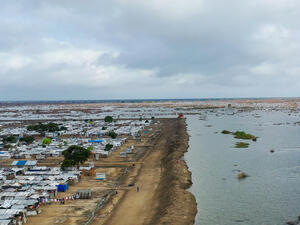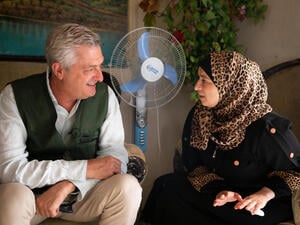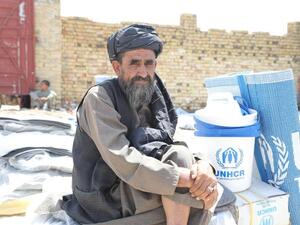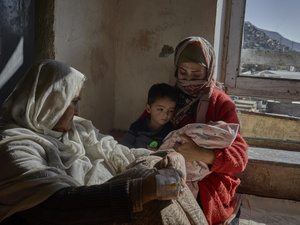UNHCR provides Ramadan evening meals to Iraqi refugees in Amman
UNHCR provides Ramadan evening meals to Iraqi refugees in Amman
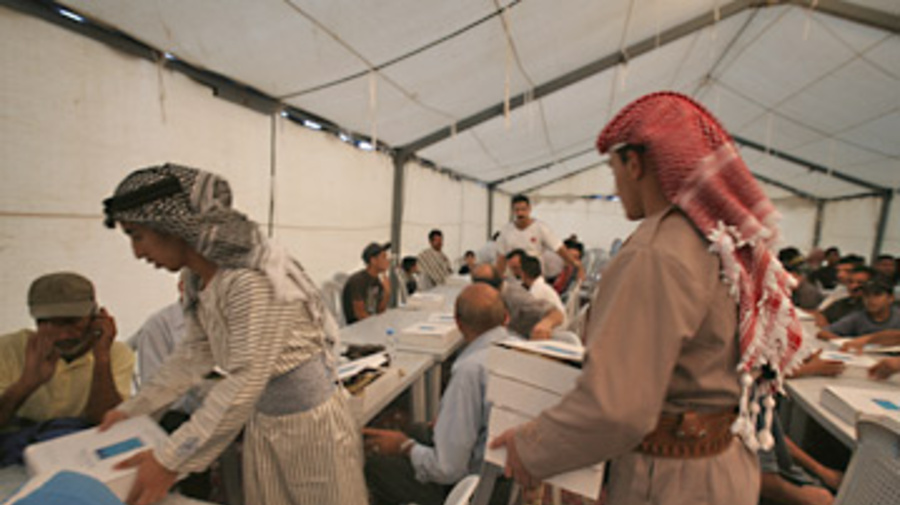
A UNHCR Ramadan food tent for Iraqi refugees and needy Jordanians in Khreibet al Souq, eastern Amman.
AMMAN, Jordan, September 29 (UNHCR) - Over the past four weeks, Muslims in Jordan have observed the annual Islamic fast of Ramadan. And when the sun sinks below the horizon, Iraqi refugees and Jordanian locals have been breaking bread together in several areas of Amman.
For the second straight year, the UN refugee agency has provided iftar (the evening meal during Ramadan) to needy Iraqis and Jordanians during the month of Ramadan, which ends on Tuesday. Muslims believe that feeding someone iftar as a form of charity is very rewarding.
This year, UNHCR and local partner, Tikeyet Um Ali (TUA), have set up seven food tents in areas with a high concentration of Iraqi refugees, such as Suweileh, Sahab and Al Ashrafeyeh. Some people happily eat their evening meal in the tents alongside needy locals, while others asked for a takeaway meal. Others, possibly angry at having to seek charity, enter the tents reluctantly.
More and more Iraqis are seeking assistance from UNHCR and other agencies as they exhaust their savings and amid rising world food prices.
UNHCR field teams have spread the word about the iftar tents, which are designed to accommodate 200 people per day - that means 1,400 hot meals handed out on a daily basis. The food, prepared by TUA, is selected to meet the nutritional needs of the refugees and their children, each meal containing a good balance of protein, carbohydrates and vitamins.
The tents have also helped create a sense of community and belonging among needy Iraqi refugees. "Ramadan is all about spending time with family and friends, and sharing with strangers," said one refugee, Dalal. "We not only get the thawab [blessings] from the fast, but also get the chance to meet and interact with people with similar experiences and struggles that we face."
The neediest refugees would simply not be able to mark Ramadan properly without the tents. "We are living in very harsh circumstances," said Ahmad. "Coming to this tent every day allows my family to enjoy a decent meal during Ramadan, something I would not have been able to provide."
UNHCR continues to identify an increasing number of Iraqi families who are becoming more vulnerable and needy, be it for food, medical treatment or psychosocial support. The waiting list is growing.
"Increasing the number of Ramadan tents this year is just one element of our trying to help Iraqis face the harshness of today's difficult economic situation," said Imran Riza, UNHCR's Representative in Jordan. "It is a particularly important element in Ramadan as it not only encourages the family aspect of this special month, but also brings together Iraqis and Jordanians."
Food provision continues to be a major challenge to UNHCR. The increase in fuel and food prices has further forced a substantial number of Iraqis into poverty and dependence. Throughout the year, there has been a regular process of distributing food packages to approximately 3,550 needy families on a monthly basis. Packages are considered supplementary and contain items such as rice, flower, oil and some canned food. Due to logistical difficulties in providing food packages to refugees in an urban setting, the refugee agency has taken the decision to phase out food assistance and substitute it with cash assistance, which will give the refugees easier access to aid, in a more dignified manner.
By Dana Bajjali in Amman, Jordan



